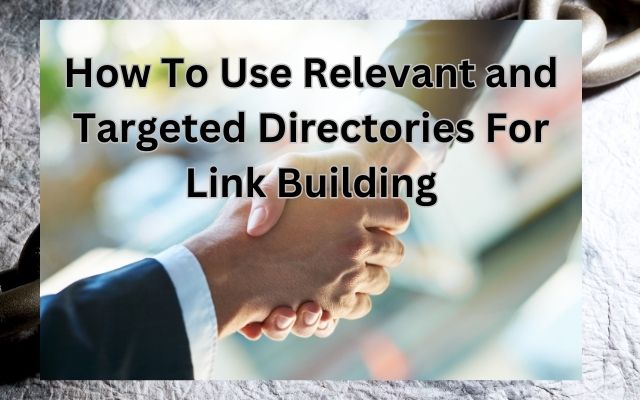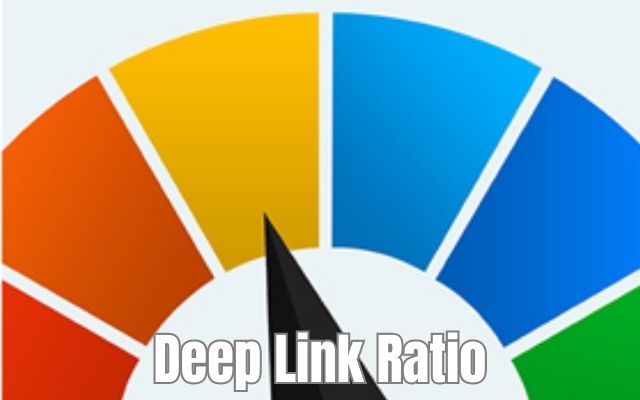How To Use Relevant and Targeted Directories For Link Building

To improve your website’s SEO, it is crucial to use relevant and targeted directories for effective link building. Link building is an essential aspect of search engine optimization (SEO) that helps improve website visibility and organic rankings. One effective strategy for link building is utilizing relevant, targeted directories. These directories serve as valuable resources to connect with your target audience and acquire high-quality backlinks. In this article, we will explore the steps to effectively use relevant, targeted directories for successful link building.
Use Relevant, Targeted Directories For Link Building
Research and Identify Relevant Directories:
- Start by conducting thorough research to identify directories that are relevant to your industry or niche.
- Look for directories that have a good reputation, high domain authority, and a significant number of quality websites listed within them.
- Consider niche-specific directories that cater specifically to your industry or target audience.
Evaluate Directory Quality:
- Assess the quality of each directory by examining its domain authority, website traffic, and the overall relevance of the listed websites.
- Verify if the directory is well-maintained, regularly updated, and has clear submission guidelines.
- Avoid directories that are filled with low-quality or spammy websites, as this can negatively impact your link building efforts.
Analyze Competitor Backlinks:
- Analyze the backlinks of your competitors to identify directories where they have obtained links.
- Tools like Ahrefs or SEMrush can help you discover competitor backlinks and provide insights into their link building strategies.
- Focus on directories that have helped your competitors gain valuable backlinks to target similar opportunities.
Follow Submission Guidelines:
- Carefully review and follow the submission guidelines provided by each directory.
- Ensure that you provide accurate and relevant information when submitting your website for inclusion.
- Pay attention to the directory’s requirements for titles, descriptions, and any specific categories or tags.
Create Compelling Listings:
- Craft compelling and engaging listings that effectively showcase your website’s value and relevance.
- Use persuasive language, highlight unique selling points, and include relevant keywords naturally.
- Provide accurate and up-to-date information to increase the chances of getting approved.
Monitor and Maintain Listings:
- Regularly monitor your directory listings to ensure they remain active and accurate.
- Update any changes to your website’s information promptly to maintain consistency.
- Be responsive to any inquiries or requests from directory administrators to maintain a positive relationship.
Diversify Your Directory Portfolio:
- Avoid relying solely on one or a few directories for link building.
- Seek opportunities in different directories to diversify your link profile and increase your chances of acquiring high-quality backlinks.
- Continuously explore new directories and stay updated on emerging directories within your industry.
FAQ: Using Relevant and Targeted Directories for Link Building
Q1: Why should I use relevant and targeted directories for link building?
A: Using relevant and targeted directories for link building allows you to acquire high-quality backlinks from authoritative sources within your industry or niche. This helps improve your website’s visibility, organic rankings, and overall search engine optimization (SEO) efforts.
Q2: How do I identify relevant directories for my link building strategy?
A: To identify relevant directories, conduct thorough research within your industry or niche. Look for directories that have a good reputation, high domain authority, and a significant number of quality websites listed. Consider niche-specific directories that cater to your target audience.
Q3: What criteria should I consider when evaluating directory quality?
A: When evaluating directory quality, consider factors such as domain authority, website traffic, relevance of listed websites, and the overall reputation of the directory. Avoid directories filled with low-quality or spammy websites, as they can harm your link building efforts.
Q4: How can I find competitor backlinks to identify relevant directories?
A: Tools like Ahrefs or SEMrush can help you analyze competitor backlinks and discover directories from which they have obtained links. By studying your competitors’ link profiles, you can gain insights into successful directories and target similar opportunities.
Q5: What are some best practices when submitting to directories?
A: Follow the submission guidelines provided by each directory and ensure that you provide accurate and relevant information. Craft compelling listings that highlight your website’s value, use persuasive language, and incorporate relevant keywords naturally.
Q6: How should I maintain my directory listings?
A: Regularly monitor your directory listings to ensure they remain active and accurate. Update any changes to your website’s information promptly. Be responsive to inquiries or requests from directory administrators to maintain a positive relationship.
Q7: Should I rely on a single directory or diversify my link building efforts?
A: It is advisable to diversify your link building efforts by targeting multiple directories. Relying solely on one or a few directories may limit your link profile’s diversity. Explore opportunities in different directories to expand your reach and increase the chances of acquiring high-quality backlinks.
Q8: Are there emerging directories that I should be aware of?
A: Yes, the directory landscape is constantly evolving. Stay updated on emerging directories within your industry or niche. Keep an eye out for new opportunities and assess their relevance and quality before incorporating them into your link building strategy.
Using relevant and targeted directories for link building can significantly enhance your website’s SEO performance. By considering directory quality, following best practices, and diversifying your efforts, you can acquire valuable backlinks and improve your website’s visibility in search engine results.
Read More:
- How to Choose Websites for Quality Link Building
- How To Use HARO For Link Building And PR
- 5 Effective Ecommerce Link Building Strategies
- Overcoming Link Building Challenges: Internal Politics, Technical Flaws, and More
- 18 Popular Link Building Tactics You Should Avoid
- 12 Great Link Building Tools That Are Essential To Your Success
- Coupon Link Building for Ecommerce: A Step-by-Step Guide
- Understanding Internal Linking for SEO
- Top 5 Link Building Mistakes To Avoid In 2023
Conclusion:
Utilizing relevant, targeted directories is a valuable strategy for effective link building. By conducting thorough research, evaluating directory quality, and following submission guidelines, you can acquire high-quality backlinks that contribute to your website’s SEO success. Remember to analyze competitor backlinks, create compelling listings, and regularly monitor and maintain your directory listings. By diversifying your directory portfolio, you can expand your link building efforts and enhance your website’s visibility in search engine results. Embrace the power of relevant directories to strengthen your link profile and drive organic traffic to your website.







